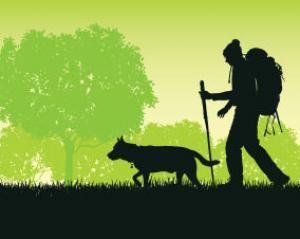The Scoop on Pets, Pollution, and Water Quality
Looks, size, and diet don't matter---pets can pollute if you don't pick up after them. That's because pet waste left on the ground eventually contaminates the watershed. Waste components like fecal bacteria and nutrients are washed into storm drains, streams, and other receiving waters by irrigation, rain, melting snow, and flooding. They can also simply leach through the soil and into the groundwater. Even waste from smaller pets can have an impact on the local water environment.
It doesn't take long for one pet's daily contribution to accumulate into a harmful quantity. Pet waste steals oxygen from the water, killing fish and other wildlife and plants. Nutrients from animal waste feed algae growth that can degrade water quality. The related bacteria can also cause sickness and threaten a community's economic vitality. Whether left in an area that is rural or urban, wet or dry, wooded or open fields, paved or unpaved, or even your own backyard, pet waste can end up contaminating the watershed.
You Can Prevent Pet Pollution!
Pet waste is one type of pollution that can easily be addressed. A pet waste bag (biodegradable, if possible) and environmental awareness are really all it takes to keep our water resources safe from this type of contamination. Pet walkers should just simply pick up the waste and place it in a trash can, flush it down the toilet (without bag), or otherwise dispose of it as the municipality allows. Be a responsible pet owner --- don't let your pet pollute!
It's Worse Than Inconvenient
Stepping in pet waste is one thing, but leaving it unattended is against the law in many places. Beyond making water unsafe for drinking, swimming, boating, and fishing, unattended waste attracts flies that spread disease and pose risks to areas where children play. Even if you are not required to do so by law, be responsible and help protect the watershed where you live.
Dos and Don'ts for Pet Owners!
Do
- Remember to bring a bag or other means to pick up waste when walking your pet.
- Always pick up after your pet.
- Dispose of pet waste in trash can, pet waste receptacle, or according to local laws.
- Wash your hands with soap and water after pickup.
Don't
- Leave pet waste on the ground anywhere.
- Place pet waste in your compost pile or near water supplies or vegetable gardens.
- Flush cat litter or bird seed down the toilet.
- Forget to check the borough code.

